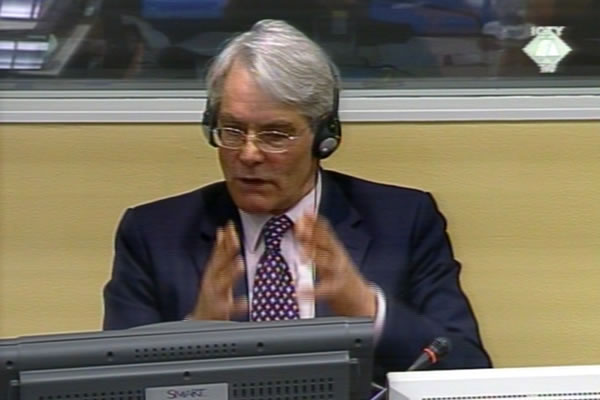Home
TOLIMIR WAS MLADIC’S RIGHT HAND MAN
British general Rupert Smith began his evidence at the trial of General Zdravko Tolimir, former Mladic’s assistant for security and intelligence in the VRS Main Staff. General Smith was the last UNPROFOR commander in Bosnia and Herzegovina
 Rupert Smith, witness at the Zdravko Tolimir trial
Rupert Smith, witness at the Zdravko Tolimir trial ‘General Gvero played second fiddle to General Tolimi r who was in turn described by Mladic as his right hand man’, British general Rupert Smith said in a statement he gave the OTP investigators in 1996.
Testifying at the trial of General Zdravko Tolimir charged with genocide and other crimes in Srebrenica and Zepa in July 1995, General Smith explained what this impression was based on. Mladic himself described Tolimir as his ‘right hand man’ – Smith would not have put that in quotation marks in his statement otherwise. The impression that Tolimir was ‘Mladic’s trusted and close associate’ was based on a number of meetings Smith had in 1995 as UNPROFOR commander in BH with Mladic, commander of the VRS Main Staff; Tolimir often attended those meetings. From their relationship, body language and their tone of voice, Smith was able to conclude they talked ‘as equals’ and that they ‘worked together, not in a strict hierarchical relationship’.
In late July 1995, Smith negotiated the evacuation of the civilians from Zepa with Mladic’s right hand man. Smith concluded that Tolimir was personally in charge of the cleansing of the enclave. Tolimir had to find the buses and oversee the boarding of the civilians. According to Smith, Tolimir played the same role earlier that month in Srebrenica, although Smith could not say whether Tolimir was physically present in Srebrenica. He remained adamant even when the prosecutor told him Tolimir had not been in Srebrenica.In light of Tolimir’s function as Mladic’s assistant for security and intelligence, a key element in the command process, according to Smith, everything that happened after the fall of Srebrenica was within Tolimir’s purview.
Before General Smith started his evidence, the transcript of the testimony he gave in 2003 at the trial of the seven Bosnian Serb military and police officers charged with the crimes in Srebrenica was admitted into evidence. Among them were three security officers: from the VRS Main Staff, the Drina Corps and the Zvornik Brigade; all three were Tolimir’s subordinates. The three received the harshest punishment: Beara and Popovic were sentenced to life and Nikolic to 35 years in prison.
Smith briefly recapped his statements and repeated some of the claims he made recently at the Radovan Karadzic trial. He described how in early 1995 the warring factions began their preparations for a military solution to the conflict in order to win the war by the end of the year. The BH Army built up its strength and bought more weapons, while the Republika Srpska Army was getting ready to tighten the noose around the enclaves in Srebrenica and Zepa in order to be able to control them better and to free up some of the forces tied up there and commit them to other active fronts. The intent to tighten the noose around the UN protected enclaves was apparent from the Bosnian Serb strategy of preventing supply convoys from entering the enclave. This not only served to exhaust the population, but to weaken the strength of the enemy troops and the peace-keepers to resist the final VRS offensive.
In this situation, both sides tried to use UNPROFOR for their own ends, General Smith said. The Bosnian Serbs tried to use it as ‘hostage’ to exert pressure on the international community, and the BH Army as its ‘shield’, turning the peace-keepers effectively into their allies, and to provoke the outside intervention.
General Tolimir will have, as indicated, four full days to cross-examine General Smith.
Linked Reports
- Case : Tolimir - "Srebrenica"
- 2011-03-14 ANONYMOUS SAVIOR
- 2011-03-10 ‘NON-VIOLENT’ ETHNIC CLEANSING IN ZEPA
- 2011-03-08 PRSTOJEVIC: ‘I THINK ONE THING AND SAY SOMETHING ELSE’
- 2011-03-22 TOLIMIR: BH GOVERNMENT, VRS AND UN AGREED ABOUT THE EVACUATION OF ZEPA
- 2011-03-23 AGREEMENT FOLLOWED OCCUPATION
- 2011-03-24 ‘COOPERATIVE DEMOCRACY’ AND ‘HUMANITARIAN AIRSTRIKES’
